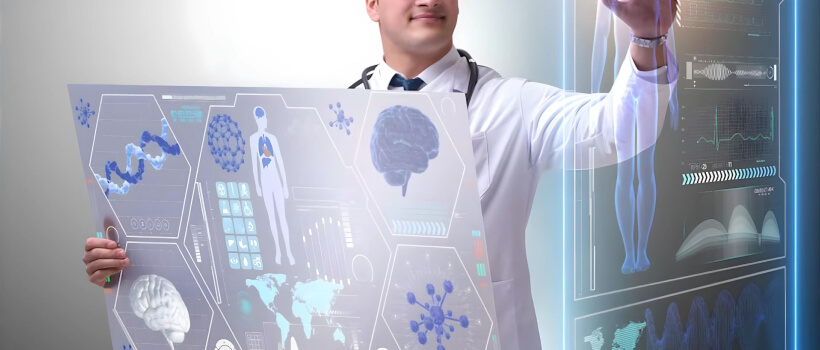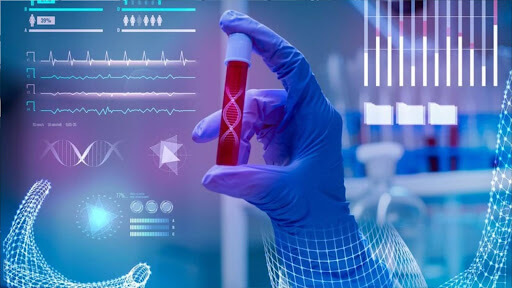 1-800-805-5783
1-800-805-5783 
For decades, medicine has relied on a “one-size-fits-all” approach. However, this approach must often be revised, especially in the era of new-age technologies, as individual patients can respond differently to medications and treatments.
This is where precision medicine enters the picture. It empowers patients by considering their unique genetic makeup, environment, and lifestyle, enhancing patient care. Precision medicine, sometimes called personalized or stratified medicine, revolutionizes healthcare, putting the patient at the center of their health journey.
By leveraging the power of big data in medicine, including vast datasets from genomics, electronic health records, and more, precision medicine allows doctors to tailor treatment plans to each individual’s needs.
This exciting new field, with its immense promise for improving treatment efficacy, reducing side effects, and ultimately improving healthcare, inspires a new era of personalized care. Let’s delve deeper into the world of precision medicine and explore how big data and genomics are shaping the future of healthcare.

For many years, medicine’s mainstay has been a uniform approach to care. However, this strategy must frequently consider each person’s distinct biological composition. This is where stratified medicine, also known as personalized medicine or precision medicine, enters the picture to transform healthcare.
A. Definition and Conceptual Framework:
Precision medicine, sometimes personalized or stratified medicine, represents a fundamental shift in healthcare philosophy. Traditionally, treatment plans were based on a patient’s diagnosis alone. Precision medicine goes a step further, considering an individual’s unique biology and leveraging the power of big data in medicine.
This includes vast datasets from a patient’s genomics, electronic health records (EHRs), and lifestyle information. By analyzing this comprehensive data, doctors can better understand a patient’s disease and predict how they might respond to different treatments.
B. Historical Background and Evolution:
The concept of personalized medicine has roots that stretch back centuries, with early observations of individual medication responses. However, the advancement of genomics laid the foundation for modern precision medicine, marking a significant milestone in the evolution of healthcare.
The Human Genome Project, completed in 2003, revolutionized our understanding of human genes and their role in health and disease. This paved the way for developing new technologies and therapies tailored to specific genetic variations.
C. Key Components and Technologies Involved:
Precision medicine relies on a powerful arsenal of tools and technologies:
D. Examples of Precision Medicine Applications:
Precision medicine is already making a real difference in various areas of healthcare:

The field of precision medicine hinges on a critical element: big data in medicine. This vast and ever-growing pool of information encompasses a diverse range of sources, including:
A. Definition and Importance of Big Data in Medicine:
Big data in medicine is not merely a collection of information; it’s a powerful tool that allows researchers and healthcare professionals to unlock a deeper understanding of diseases and individual patient responses.
B. How Big Data Enhances Precision Medicine:
Big data empowers precision medicine in several key ways:

The field of precision medicine is revolutionizing healthcare by tailoring treatments to an individual’s unique biology. Genomics is at the heart of this revolution, studying an individual’s complete set of genetic instructions, also known as their genome.
Genomics plays a pivotal role in precision medicine by offering a deeper understanding of how our genes influence disease susceptibility and treatment response.
A. Understanding Genomics and Its Role in Precision Medicine:
The approximately 3 billion nucleotides that make up our DNA, the blueprint for life, are arranged in a particular order. Genetic variations in this sequence can affect our response to medication, our chance of contracting specific diseases, and even the effectiveness of medical devices.
By analyzing an individual’s genome, researchers can identify these variations and leverage this information to guide treatment decisions in precision medicine.
A report published by the National Human Genome Research Institute, a division of the National Institutes of Health (NIH), states that more than 5,000 genetic tests are currently accessible to make a patient’s risk assessment or diagnose a disease.
B. How Genomics Data Is Utilized in Treatment Decisions:
Genomics data is used in precision medicine in several ways:
C. Case Studies Highlighting Genomics in Precision Medicine:
The impact of genomics in precision medicine is no longer theoretical. Here are a few real-world examples:
Precision medicine is rapidly evolving, and exciting new technologies are poised to shape its future.
A. Emerging Technologies Shaping the Future of Precision Medicine:
Artificial Intelligence (AI) and Machine Learning (ML): These powerful tools can analyze vast genomic, clinical, and environmental datasets. According to a study published in Nature Medicine, AI can increase cancer diagnosis accuracy by up to 15% over conventional techniques. AI can also personalize treatment plans and more accurately identify new drug targets.
Advanced Gene Editing Techniques: Technologies like CRISPR-Cas9 hold immense promise for correcting genetic mutations that contribute to disease. A report published by the National Academies of Sciences, Engineering, and Medicine suggests that over 8,000 genetic diseases may be treated with CRISPR gene editing.
B. Potential Impact of Precision Medicine on Healthcare Delivery:
The widespread adoption of precision medicine has the potential to revolutionize healthcare delivery in several ways:
Improved Treatment Efficacy: By tailoring treatments to a patient’s specific needs, precision medicine can lead to more effective therapies with fewer side effects. A 2020 study published in the Journal of the American Medical Association (JAMA) found that precision medicine could increase cancer treatment response rates by up to 30%.
C. Opportunities for Collaboration and Innovation in Precision Medicine Research:
The continued advancement of precision medicine requires robust collaboration and innovation across various stakeholders:
A 2022 report by the Alliance for Regenerative Medicine suggests that increasing public-private partnerships can accelerate the development of new precision medicine therapies by 2-3 years.

The future of healthcare is auspicious as big data, precision medicine, and IoT in medical devices come together. Utilizing this potent combination, we can go beyond a “one-size-fits-all” strategy and customize treatments to each person’s biology. The following are some ways that this individualized approach could transform patient care:
Promoting open communication, data exchange, and continuous innovation can help achieve this groundbreaking approach’s full potential. As we learn more about the human genome and leverage big data, a new era of precision medicine, where treatments are customized for each patient, can be ushered in, opening the door to a healthier future for all.